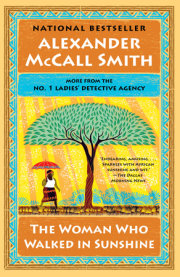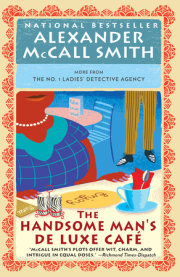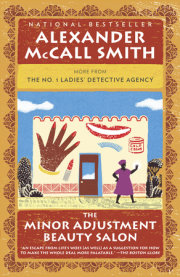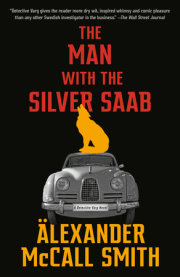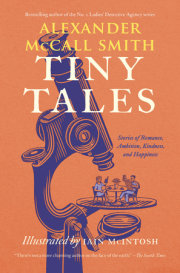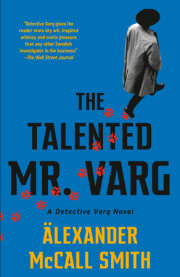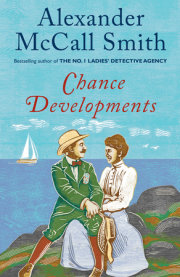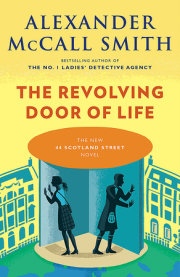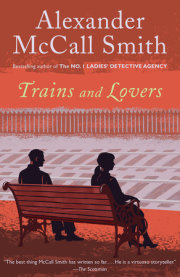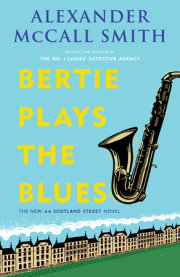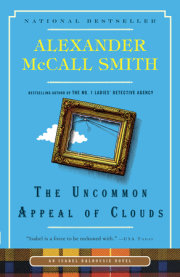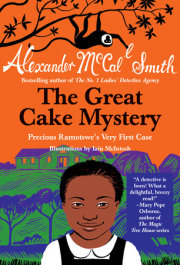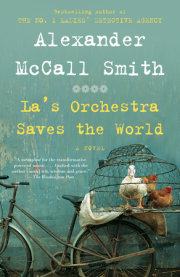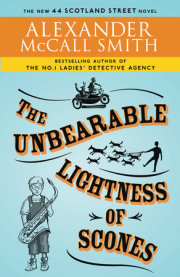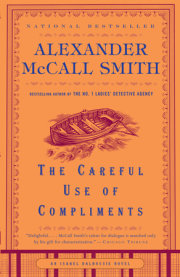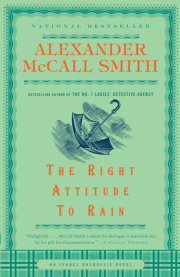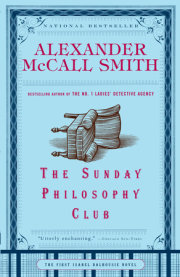CHAPTER ONE
The World as Seen by
Another Person
Mma Ramotswe, the daughter of the late Obed Ramotswe of Mochudi, near Gaborone, Botswana, Africa, was the announced fiancée of Mr J.L.B. Matekoni, son of the late Pumphamilitse Matekoni, of Tlokweng, peasant farmer and latterly chief caretaker of the Railway Head Office. It was a fine match, everybody thought; she, the founder and owner of The No. 1 Ladies' Detective Agency, Botswana's only detective agency for the concerns of both ladies and others; he, the proprietor of Tlokweng Road Speedy Motors, and by general repute one of the finest mechanics in Botswana. It was always a good thing, people said, to have independent interests in a marriage. Traditional marriages, in which the man made all the decisions and controlled most of the household assets, were all very well for women who wanted to spend their time cooking and looking after children, but times had changed, and for educated women who wanted to make something of their lives, it was undoubtedly better for both spouses to have something to do.
There were many examples of such marriages. There was that of Mma Maketetse, for example, who had set up a small factory specialising in the making of khaki shorts for schoolboys. She had started with a cramped and ill-ventilated sewing room at the back of her house, but by employing her cousins to cut and sew for her she had built up one of Botswana's best businesses, exporting khaki shorts to Namibia in the face of stiff competition from large clothing factories in the Cape. She had married Mr Cedric Maketetse, who ran two bottle stores in Gaborone, the capital, and had recently opened a third in Francistown. There had been a faintly embarrassing article about them in the local paper, with the catchy headline: Shorts manufacturing lady buttons it up with drink merchant. They were both members of the Chamber of Commerce, and it was clear to all that Mr Maketetse was immensely proud of his wife's business success.
Of course, a woman with a successful business had to be careful that a man who came courting her was not merely looking for a way of spending the rest of his days in comfort. There had been plenty of cases of that happening, and Mma Ramotswe had noticed that the consequences of such unions were almost inevitably dire. The man would either drink or gamble away the profits of his wife's enterprise, or he would try to run the business and destroy it in the process. Men were good at business, thought Mma Ramotswe, but women were just as good. Women were thriftier by nature; they had to be, trying to run households on a tight budget and feed the ever-open mouths of children. Children ate so much, it seemed, and one could never cook enough pumpkin or porridge to fill their hungry bellies. And as for men, they never seemed happier than when eating large quantities of expensive meat. It was all rather discouraging.
"That will be a good marriage," people said, when they heard of her engagement to Mr J.L.B. Matekoni. "He is a reliable man, and she is a very good woman. They will be very happy running their businesses and drinking tea together."
Mma Ramotswe was aware of this popular verdict on her engagement and shared the sentiment. After her disastrous marriage to Note Mokoti, the jazz trumpeter and incorrigible ladies' man, she had decided that she would never remarry, in spite of frequent offers. Indeed, she had initially turned down Mr J.L.B. Matekoni when he had first proposed, only to accept him some six months later. She had realised that the best test of a prospective husband involves no more than the asking of a very simple question, which every woman--or at least every woman who has had a good father--can pose and to which she will know the answer in her bones. She had asked herself this question in respect of Mr J.L.B. Matekoni, and the answer had been unambiguous.
"And what would my late Daddy have thought of him?" she said to herself. She posed the question after she had accepted Mr J.L.B. Matekoni, as one might ask oneself whether one had taken the right turning at a road junction. She remembered where she had been when she asked it. She was taking an evening walk near the dam, along one of those paths that led this way and that through the thorn bushes. She had suddenly stopped, and looked up at the sky, into that faint, washed out blue that would suddenly, at the approach of sunset, become streaked with copper-red. It was a quiet time of the day, and she was utterly alone. And so she spoke the question out loud, as if there were somebody there to hear it.
She looked up at the sky, half-expecting the answer to be there. But of course it was not, and she knew it anyway, without the need to look. There was no doubt in her mind that Obed Ramotswe, who had seen every sort of man during the time he had worked in those distant mines, and who knew the foibles of all of them, would have approved of Mr J.L.B. Matekoni. And if that were the case, then she should have no fears about her future husband. He would be kind to her.
Now, sitting in the office of the No. 1 Ladies' Detective Agency with her assistant, Mma Makutsi, the most distinguished graduate of her year at the Botswana Secretarial College, she reflected on the decisions which her impending marriage to Mr J.L.B. Matekoni would oblige her to take. The most immediate issue, of course, had been where they might live. That had been decided rather quickly; Mr J.L.B. Matekoni's house near the old Botswana Defence Club, attractive though it undoubtedly was, with its old colonial verandah and its shiny tin roof, was not as suitable as her own house in Zebra Drive. His garden was sparse; little more than a swept yard, in fact; whereas she had a good collection of paw-paw trees, some very shady acacias, and a well-established melon patch. Moreover, when it came to the interiors, there was little to recommend Mr J.L.B. Matekoni's spartan corridors and unlived-in rooms, especially when compared with the layout of her own house. It would be a great wrench, she felt, to abandon her living room, with its comfortable rug on the red-polished concrete floor, her mantelpiece with her commemorative plate of Sir Sereste Khama, Paramount Chief, Statesman, and first President of Botswana, and, in the corner, her treadle sewing machine that still worked so well, even in a power cut when more modern sewing machines would fall silent.
She had not had to say very much about it. In fact, the decision in favour of Zebra Drive did not even have to be spelled out. After Mr J.L.B. Matekoni had been persuaded by Mma Potokwane, the matron at the orphan farm, to act as foster father to an orphaned boy and his crippled sister, the children had moved into her house and immediately settled in. After that, it was accepted that the whole family would, in due course, live in Zebra Drive. For the time being, Mr J.L.B. Matekoni would continue to live in his own house, but would take his evening meal at Zebra Drive.
That was the easy part of the arrangement. Now there remained the issue of the business. As Mma Ramotswe sat at her desk, watching Mma Makutsi shuffling papers in the filing cabinet of their small office, her thoughts were taken up with the difficult task that lay ahead of her. It had not been an easy decision to make, but she had now made it and she would have to steel herself and put it into effect. That was what business was all about.
One of the most elementary rules of running a business was that facilities should not be needlessly duplicated. After she and Mr J.L.B. Matekoni married, they would have two businesses with two offices. They were very different concerns, of course, but Tlokweng Road Speedy Motors had a large amount of office space and it would make a great deal of sense for Mma Ramotswe to run her agency from there. She had made a close inspection of Mr J.L.B. Matekoni's building and had even obtained advice from a local builder.
"There will be no difficulty," he had said after inspecting the garage and its office. "I can put in a new door on that side over there. Then the clients for your business can come in and not have anything to do with all those greasy goings-on in the workshop."
Combining the two offices would enable Mma Ramotswe to let out her own office and the income derived from that would make all the difference. At present, the uncomfortable truth about the No. 1 Ladies' Detective Agency was that it was simply not making enough money. It was not that there were no clients--there had been a ready supply of those--it was just that detective work was immensely time-consuming and people were simply unable to pay for her services if she charged at a realistic hourly rate. A couple of hundred pula for the resolution of uncertainty or for the finding of a missing person was affordable, and usually well worth it, but several thousand pula for the same job was another matter altogether. Doubt could be preferable to sure knowledge if the difference between the two was a large sum of money.
The business might have broken even if it were not for the wages which Mma Ramotswe had to pay Mma Makutsi. She had originally employed her as a secretary, on the grounds that every business which wished to be taken seriously had to have a secretary, but had soon realised the talents that lay behind those large spectacles. Mma Makutsi had been promoted to assistant detective, a position that gave her the status she so craved. But Mma Ramotswe had felt obliged to raise her pay at the same time, thus plunging the agency's current account further into the red.
She had discussed the matter with Mr J.L.B. Matekoni, who had agreed with her that she had very little choice.
"If you continue like this," he said gravely, "you'll end up bankrupt. I've seen that happen to businesses. They appoint somebody called a judicial manager. He is like a vulture, circling, circling. It is a very bad thing to happen to a business."
Mma Ramotswe clicked her tongue. "I do not want that," she said. "It would be a very sad end to the business."
They had looked at one another glumly. Then Mr J.L.B. Matekoni spoke. "You'll have to sack her," he said. "I've had to sack mechanics in the past. It is not easy, but that is what business is about."
"She was so happy when I promoted her," said Mma Ramotswe quietly. "I can't suddenly tell her that she is no longer a detective. She has no people here in Gaborone. Her people are up in Bobonong. They are very poor, I think."
Mr J.L.B. Matekoni shook his head. "There are many poor people," he said. "Many of these people are suffering badly. But you cannot keep a business going on air. That is well-known. You have to add what you get in and then take away what you spend. The difference is your profit. In your case, there is a minus sign in front of that figure. You cannot . . ."
"I cannot," broke in Mma Ramotswe. "I cannot sack her now. I am like her mother. She wants so much to be a detective and she is hardworking."
Mr J.L.B. Matekoni looked down at his feet. He suspected that Mma Ramotswe was expecting him to propose something, but he was not quite sure what it was. Did she expect him to give her money? Did she want him to meet the bills of the No. 1 Ladies' Detective Agency, even though she had made it so clear that she expected him to keep to his garage business while she attended to her clients and their unsettling problems?
"I do not want you to pay," said Mma Ramotswe, looking at him with a firmness that made him both fear and admire her.
"Of course not," he said hurriedly. "I was not thinking that at all."
"On the other hand," went on Mma Ramotswe, "you do need a secretary at the garage. Your bills are always in a mess, are they not? You never keep a note of what you pay those useless apprentices of yours. I should imagine that you make loans to them, too. Do you keep a record?"
Mr J.L.B. Matekoni looked shifty. How had she found out that the apprentices each owed him over six hundred pula and had shown no signs of being able to repay it?
"Do you want her to come and work for me?" he asked, surprised at the suggestion. "What about her detective position?"
Mma Ramotswe did not answer for a moment. She had not worked anything out, but a plan was now beginning to take shape. If they moved her office to the garage, then Mma Makutsi could keep her job as assistant detective while at the same time she could do the secretarial work that the garage needed. Mr J.L.B. Matekoni could pay her a wage for that, which would mean that the agency's accounts would be relieved of a large part of that burden. This, coupled with the rent which she would receive for the existing offices, would make the financial position look considerably healthier.
She explained her proposal to Mr J.L.B. Matekoni. Although he had always expressed doubts as to Mma Makutsi's usefulness, he could see the attractions of Mma Ramotswe's scheme, not the least of which was that it would keep her happy. And that, he knew, was what he wanted above all else.
Mma Ramotswe cleared her throat.
"Mma Makutsi," she began. "I have been thinking about the future."
Mma Makutsi, who had finished her rearranging of the filing cabinet, had made them both a cup of bush tea and was settling down to the half-hour break that she usually took at eleven in the morning. She had started to read a magazine--an old copy of the National Geographic--which her cousin, a teacher, had lent her.
"The future? Yes, that is always interesting. But not as interesting as the past, I think. There is a very good article in this magazine, Mma Ramotswe," she said. "I will lend it to you after I have finished reading it. It is all about our ancestors up in East Africa. There is a Dr Leakey there. He is a very famous doctor of bones."
Copyright © 2002 by Alexander McCall Smith. All rights reserved. No part of this excerpt may be reproduced or reprinted without permission in writing from the publisher.















